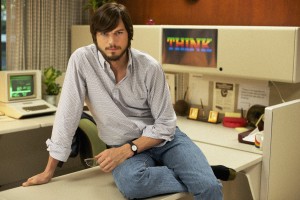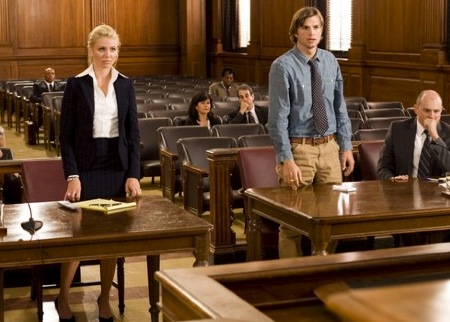
Even the most fascinating character, a true visionary with a transformative impact on the world and a story with one of the most wallopingly vindicating comebacks in business history, cannot always translate into a great movie. A straight-on biopic cannot help but feel formulaic and clichéd, with the inevitable cinematic ports of call: our hero meets his then-unknown, now-legendary posse, there is a start-up montage of hard work with no resources, and when things get going our hero is accused by the people around him of neglecting them and/or abandoning the principles he once stood for. Everyone will tell him he is wrong. He will be proven to be right. Everyone will tell him he is arrogant. He is, but he is also right. There are setbacks. There is triumph. There are “Stars: They’re Just Like Us”-style peeks into his messy private life. There is hero worship. As we learned from “The Social Network,” these stories work better when they do not try to show us why someone was great or how he or she became great but instead tell us a story about a limited set of incidents that illuminate not only the life of this real person but tell us something about our own.
The good news is that just that movie about Steve Jobs is in the works, from “The Social Network’s” Aaron Sorkin. It will show us just three different moments in Jobs’ life, as three products are about to be launched. And it will have lots of very smart dialog. I can’t wait to see it. In the meantime, we have this version, with Ashton Kutcher giving a very respectable performance as Steve Jobs, from his days as a college dropout still attending courses at Reed, in between sleeping around and dropping acid, to his triumphant return to Apple, eleven years after he was thrown out by the board of directors and the CEO he hired. Is it ironic or at least inconsistent that a movie about a man who insisted on “insanely great” innovation and joyfully disruptive, even seismic product development would be the subject of such an old-fashioned, traditionally structured storytelling? Sure. It’s like the problem of the computers and other equipment in the movie. Though it is crucial to the storyline that we see how innovative they are; a couple of decades later they all look as old-fashioned as the rotary phones. It is not a great or even a very good movie. It is reporting rather than illuminating. But it is watchable and modestly entertaining.
We learn very quickly, if clumsily, that (1) Jobs is so brilliant that a benign professor played by James Woods says he is welcome to keep going to class even though he has dropped out, (2) he is something of a user (he picks up a girl, sleeps with her, and then, when she offers him a tab of acid, tells her he is taking a second one for his girlfriend), (3) he is sad and rootless (as he and his friend and girlfriend are tripping as they lie on a blanket in the Oregon countryside, a tear slips out of his eye when he talks about being abandoned by his birth parents). And while we’re on the subject of tears, there are a lot of damp eyes in this movie. There may be no crying in baseball, but apparently there are a lot of tears in computers. And (4) he does not play well with others. He goes to work as a programmer for Atari, where he alienates everyone by being arrogant and smelling bad.
And then one day his pal Steve Wozniak (Josh Gad, in full nerd mode but with heart) shows him something cool. He has hooked up his processor to a TV screen so that he can see the code. Big time light bulb moment for the other Steve. After an awkward and unimpressive demo for the Home Brew computer club, which led to his first business opportunity. Jobs realized that there was a market for personal computers beyond the hobbyists and gearheads. The fact that this seems stunningly obvious now is a tribute in part to his vision. The clunkiness of the landline phones throughout the movie is another one. Soon he created Apple with Wozniak and some friends. Jobs set up a production facility in his parents’ garage and everyone got out their soldering irons and whatever the 1980’s equivalent of Red Bull was and went to work.
We see him rise and fall and rise again, with boardroom battles as vicious and bloodlessly violent as any scene to hit theaters this year. Jobs is portrayed as a callous but visionary leader who tells his staff that “when you can touch the human heart, it’s limitless,” but parks in the handicapped space and tells his pregnant girlfriend, “I’m sorry you have a problem, but it’s not happening to me.” He ferociously insists on loyalty from those around him but shows them none in return.
All of the performances are solid, despite the considerable handicap of 70’s hair. As one of the early Apple employees he cuts out of the IPO gains, Lukas Haas is still making good use of those puppy dog eyes that go way back to “Witness.” Matthew Modine and J.K. Simmons are nicely slick as corporate bad guys. But so much of both the personal and business story is left out that it feels empty. The Jobs we see seems more focused on the details of the financing than the details of the product. The man who felt abandoned by his birth parents (and later refused to see his birth father, even as Jobs was dying) disputed paternity and refused to see his daughter Lisa, but nevertheless named his biggest project after her? He ran up huge development costs but refused to raise the price of the products to cover them and this made the shareholders the bad guy? Why was he so ruthless in refusing stock options for the guys who were there at the beginning? And why doesn’t the movie show that Wozniak gave them a piece of his own share? Most important, why doesn’t the movie give us more than platitudes in showing us how Jobs got to “insanely great?”
Parents should know that this film includes smoking, drinking, marijuana and hallucinogens, strong language, a paternity dispute, and many tense confrontations.
Family discussion: What were Steve Jobs’ greatest strengths and faults? How can you work toward something that is “insanely great?” What does it mean to say that “the system can only produce the system” and how can we transcend that?
If you like this, try: Steve Jobs by Walter Isaacson and Steve Wozniak’s iWoz: Computer Geek to Cult Icon: How I Invented the Personal Computer, Co-Founded Apple, and Had Fun Doing It
and Steve Wozniak’s iWoz: Computer Geek to Cult Icon: How I Invented the Personal Computer, Co-Founded Apple, and Had Fun Doing It


 Joy is humiliatingly dumped by her fiancee (SNL’s Jason Sudeikis) in front of all of their friends. Jack is fired by his father (Treat Williams) for not taking the job seriously. They meet when they both take off for Vegas to get away from their disasters. So, of course, they create an even bigger one. They get completely drunk and wake up the next morning married. They quickly agree to an annulment until they win a $3 million jackpot. A judge (Dennis Miller) orders them to live together (“I sentence you to six months hard marriage”) to try to make the marriage work before he will decide how to allocate the money. And so Joy and Jack scheme to get each other to give up, then to give cause for divorce by cheating. And then, just as they begin to appreciate each other, there is time for one more setback.
Joy is humiliatingly dumped by her fiancee (SNL’s Jason Sudeikis) in front of all of their friends. Jack is fired by his father (Treat Williams) for not taking the job seriously. They meet when they both take off for Vegas to get away from their disasters. So, of course, they create an even bigger one. They get completely drunk and wake up the next morning married. They quickly agree to an annulment until they win a $3 million jackpot. A judge (Dennis Miller) orders them to live together (“I sentence you to six months hard marriage”) to try to make the marriage work before he will decide how to allocate the money. And so Joy and Jack scheme to get each other to give up, then to give cause for divorce by cheating. And then, just as they begin to appreciate each other, there is time for one more setback.